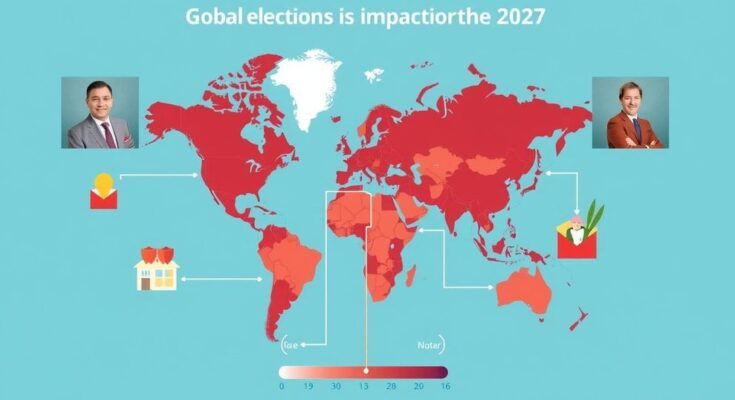In 2024, about four billion people voted globally, indicating heightened democratic engagement. Significant developments included the re-election of Donald Trump in the United States, unexpected election losses for Modi in India, political chaos in France, a Labour Party victory in the UK, Claudia Sheinbaum’s election in Mexico, Maduro’s controversial reelection in Venezuela, and a coalition government forming in South Africa.
In 2024, nearly half of the global populace, approximately four billion individuals, participated in elections, marking a significant moment in democratic engagement worldwide. In South Africa and India, governmental support for ruling parties waned amidst allegations of corruption and democratic backsliding. Various European nations experienced a rise in far-right party support, while political instability led to the collapse of governments in France and Germany. In the United States, Donald Trump made a notable political comeback, shaping the international political landscape.
The re-election of Donald Trump on November 5, characterized as one of the most remarkable political comebacks in American history, saw him decisively winning both the popular and Electoral College vote. His campaign revolved around economic discontent and anti-immigration sentiment. Democrats remain reflective on their losses, particularly as Trump gained broader appeal among non-college-educated voters. Trump insiders express confidence in an expedited and ambitious agenda due to his strengthened command of governmental processes.
In India, Prime Minister Narendra Modi’s Bharatiya Janata Party (BJP) incurred unexpected losses, compelling the formation of a coalition government, which was viewed favorably by international observers who criticized Modi’s authoritarian inclinations. This divided administration may hinder Modi’s execution of contentious policies, including the establishment of a uniform civil code and constitutional amendments enhancing the prime minister’s authority. Nevertheless, India continues to navigate its independent foreign policy, maintaining ties with Russia while fostering a favorable relationship with the United States.
Indonesia witnessed the election of Prabowo Subianto amid allegations of election irregularities. His presidency signifies an effort to attract foreign investment, despite his controversial legacy linked to prior human rights abuses. Prabowo’s alignment with China could present complications for President Trump, who may find it challenging to counter Chinese influence in the Pacific.
In Europe, France faced chaos following President Macron’s call for a snap election, leading to a fragmented parliament that hindered governmental stability. The resultant caretaker administrations in France and Germany impede significant attention toward international matters, such as support for Ukraine. Meanwhile, the United Kingdom witnessed the Labour Party’s ascendancy, raising concerns regarding their popularity and effectiveness in addressing ongoing social issues post-Brexit.
In Latin America, Mexico transitioned into a new era under the presidency of Claudia Sheinbaum. Despite controversies surrounding judicial reform, Sheinbaum’s administration is expected to perpetuate a leftist agenda amidst economic challenges and rising organized crime rates. Conversely, Venezuela’s presidential election saw Nicolás Maduro reaffirm his control, despite widespread protests against the election’s authenticity.
Finally, South Africa’s African National Congress faced a historic loss of parliamentary majority, necessitating a coalition to govern. Although some economic respite has been noted, significant social challenges such as poverty and unemployment remain critical issues.
The article discusses the elections held globally in 2024, emphasizing their implications for international politics. It provides insights into various countries, such as the United States, India, Indonesia, France, the UK, Mexico, Venezuela, and South Africa. The elections are examined through the lens of changing political dynamics, public sentiment, and the challenging socio-economic conditions across these nations. It highlights the broader trend of democratic engagement while also noting setbacks in established democracies.
The elections of 2024 have underscored the fluctuating nature of global political landscapes. Rising populism, electoral instability, and shifts in party support reflect widespread public discontent with established political norms. As countries grapple with pressing internal and external challenges, the implications of these elections will persist, shaping international relations and policy directions for years to come.
Original Source: www.semafor.com




